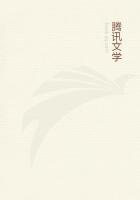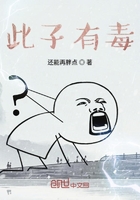'Look,'whispered he to his companion,Robin Poussepain,who sat beside him in fits of suppressed laughter at his comments on the scene before them,'why,there's Jehanneton du Buisson,the pretty lass of that old lazy-bones at the Marché-Neuf!On my soul,he means to fine her,the old dotard!Fifteen sols,four deniers parisis for wearing two rosaries!That's rather dear!Lex duri carminis—who's this?Robin Chief-de-Ville,hauberk-maker,for being passed and admitted a master in the said craft.Ah!his entrance fee.What!Two gentlemen among this rabble!Aiglet de Soins,Hutin de Mailly,two squires!Corpus Christi!Oh,for throwing dice!When shall we see our Rector here,I wonder?A fine of a hundred livres parisis to the King!Barbedienne lays about him,like a deaf one—as he is.May I be my brother the archdeacon,if that shall hinder me from playing;from playing by day,and playing by night,living at play,dying at play,and staking my soul after I have staked my shirt!Holy Virgin!what a lot of girls!One at a time,my lambkins!Ambroise Lécuyère,Isabeau la Paynette,Bérarde Gironin!By heavens,I know them all!A fine!a fine!ten sols parisis;that'll teach you minxes to wear gilded girdles!Oh,the ancient sheep's-head of a judge,deaf and doting!Ah,Florian thou dolt!Oh,Barbedienne thou booby!Do but look at him there at table—he dines off the litigant—he dines off the case—he eats—he chews—he gobbles—he fills himself!Fines,unclaimed goods,dues,costs,expenses,wages,damages,torture,imprisonment,and pillory and fetters,and loss of right—all are to him as Christmas comfits and midsummer marchpane!Look at him,the swine!Good!it begins again.Another light o'love!Thibaude-la-Thibaude,as I live!For having come out of the Rue Glatigny!Who's this young shaver?Gieffroy Mabonne,cross-bowman.He blasphemed the name of God the Father.Thibaude a fine!Gieffroy a fine!A fine for both of them!The deaf old blockhead,he is sure to have mixed up the two.Ten to one that he makes the girl pay for the oath,and the soldier for the amour!Attention,Robin Poussepain!Who are they bringing in now?What a crowd of tip-staffs!By Jupiter,the whole pack of hounds!This must be the grand catch of the day.A wild boar at least.It is one Robin!it is—and a fine specimen too!Hercules!it is our prince of yesterday,our Pope of Fools,our bell-ringer,our hunchback,our grimace!It is Quasimodo!'
It was indeed.
It was Quasimodo,bound about with cords,tightly pinioned,and under a strong guard.The detachment of officers surrounding him was led by the Captain of the watch in person,with the arms of France embroidered on his breast,and those of the City of Paris on his back.However,apart from his ugliness,there was nothing about Quasimodo to warrant this show of halberds and arquebuses.He was moody,silent,and composed,only casting from time to time a sullen and angry glance out of his one eye at the cords that bound him.He cast this same glance at his surroundings,but it was so dazed and drowsy that the women only pointed him out in derision to one another.
Meanwhile,M re Florian was busy turning over the pages of the charge drawn up against Quasimodo,handed to him by the clerk,and,having glanced at it,seemed to commune with himself for a moment.Thanks to this precaution,which he was always careful to employ before proceeding with his examination,he knew in advance the name,quality,and offence of the delinquent,made prearranged replies to foreseen questions,and contrived to find his way through all the sinuosities of the cross-examination without too openly betraying his deafness.The written charge was to him as the dog to the blind man.If it happened,now and then,that his infirmity became evident through some unintelligible address,or some question wide of the mark,it passed with some for profundity,and with others for imbecility.In either case,the honour of the magistracy underwent no diminution:better far that a judge should be reputed imbecile or profound rather than deaf.He therefore took such precautions to conceal his deafness from others,and usually succeeded so well,that he had come at last to deceive himself on the subject—an easier matter than one might suppose:for all hunchbacks walk with head erect;all stammerers are fond of talking;deaf people invariably speak in a whisper.For his part,he thought,at most,that perhaps his ear was a trifle less quick than other people's.This was the sole concession he would make to public opinion in his rare moments of candour and self-examination.
Having then ruminated well on Quasimodo's case,he threw back his head and half-closed his eyes,by way of extra dignity and impartiality,with the result that,for the moment,he was both blind and deaf—a twofold condition without which no judge is really perfect.
In this magisterial attitude he commenced his examination.
'Your name?'
Now here was a case which had not been'provided for by the law'—the interrogation of one deaf person by another in similar plight.
Quasimodo,who had no hint of the fact that he was being addressed,continued to regard the judge fixedly,but made no reply.The judge,deaf himself,and unaware of the deafness of the accused,imagined he had answered,as accused persons generally did,and continued with his usual stupid and mechanical self-confidence:
'Very good—your age?'
Quasimodo made no answer to this question either,but the judge,fancying he had done so,went on:
'Now,your calling?'
Continued silence.The bystanders,however,began to whisper and look at each other.














